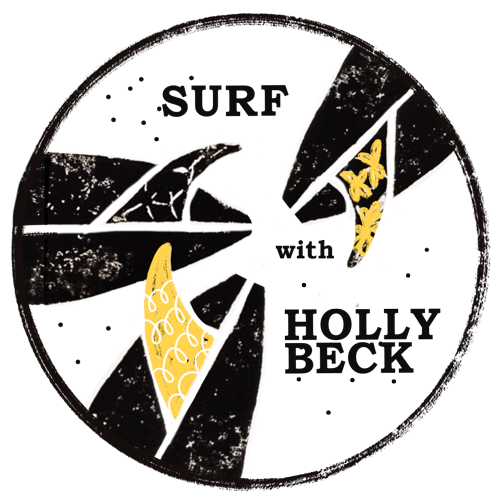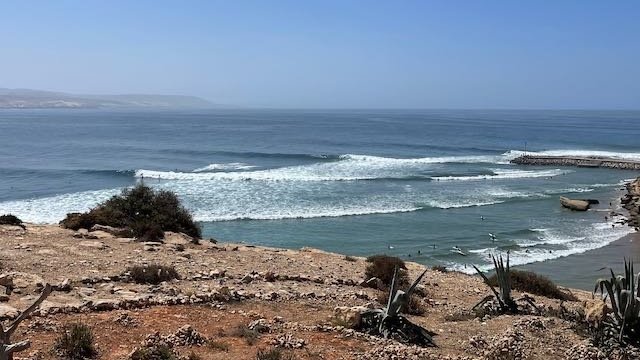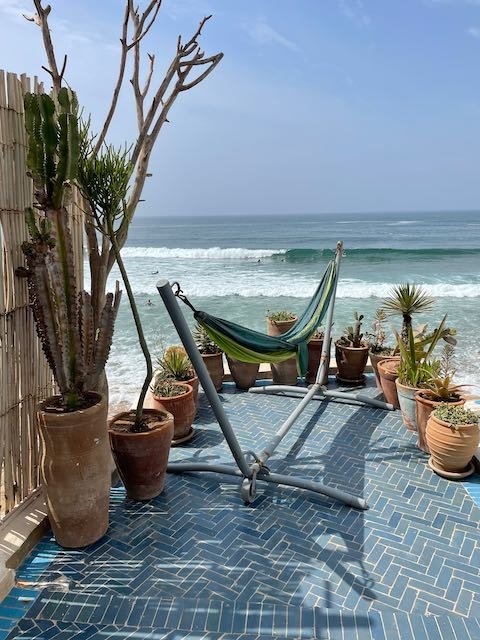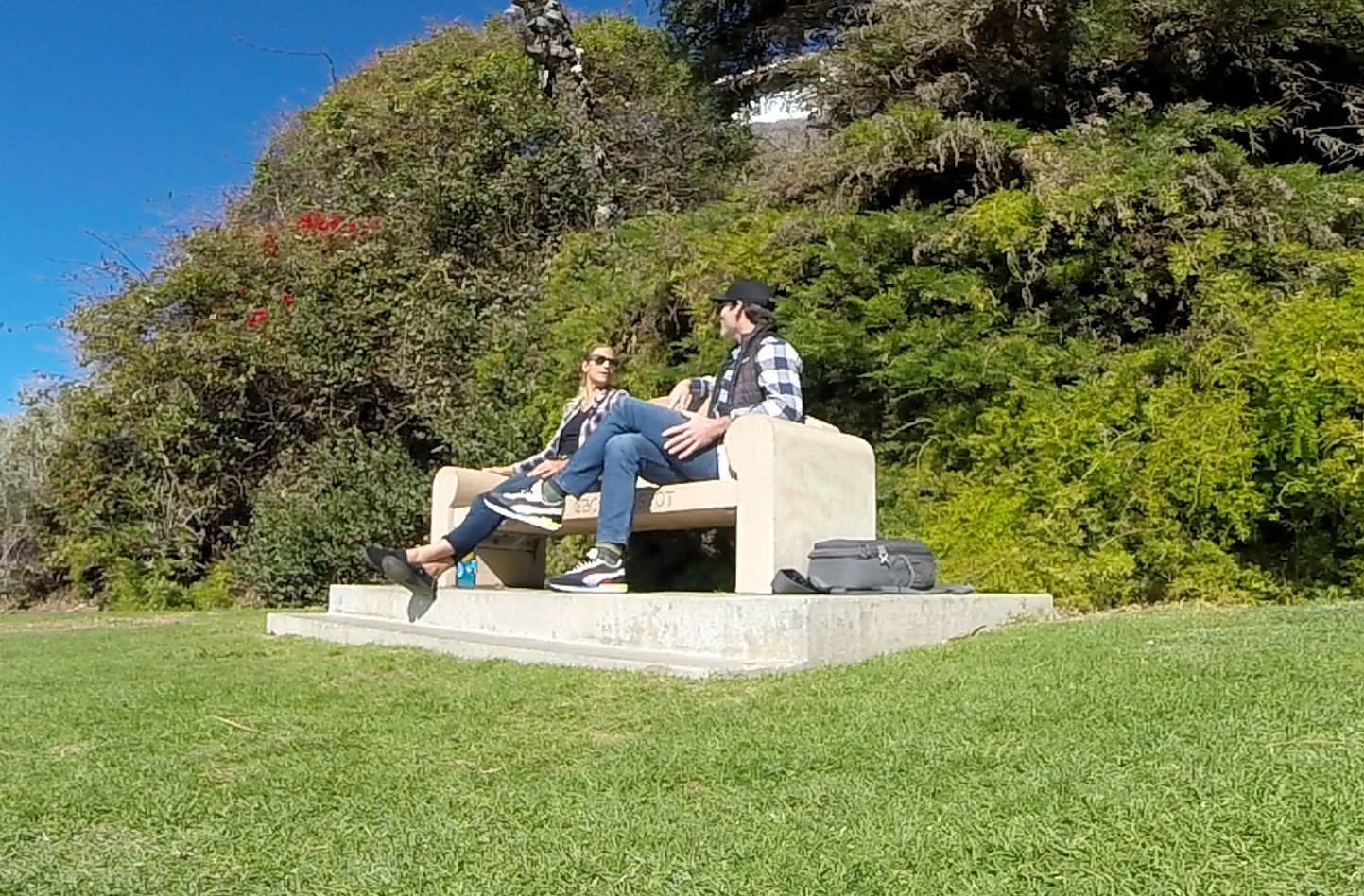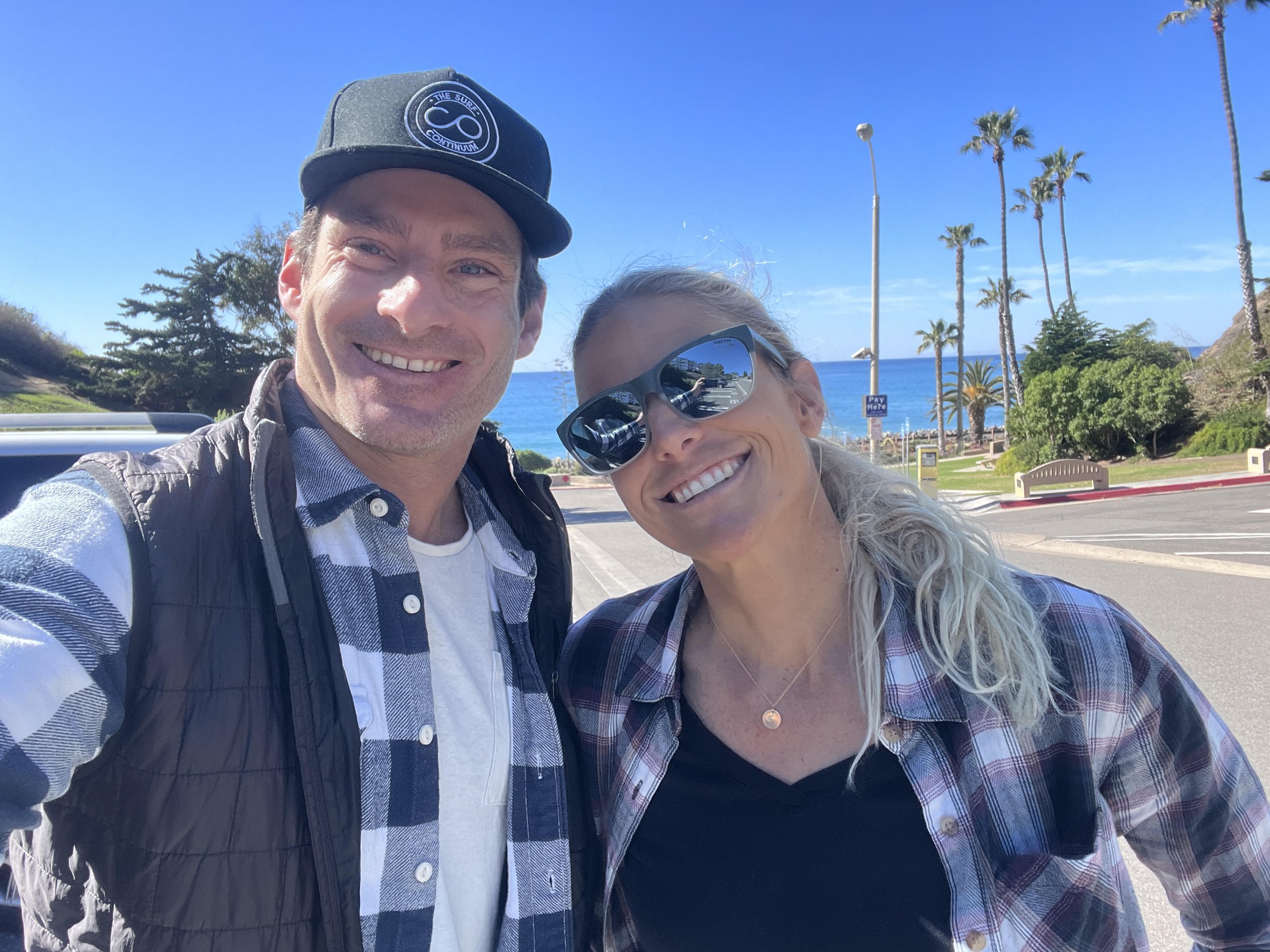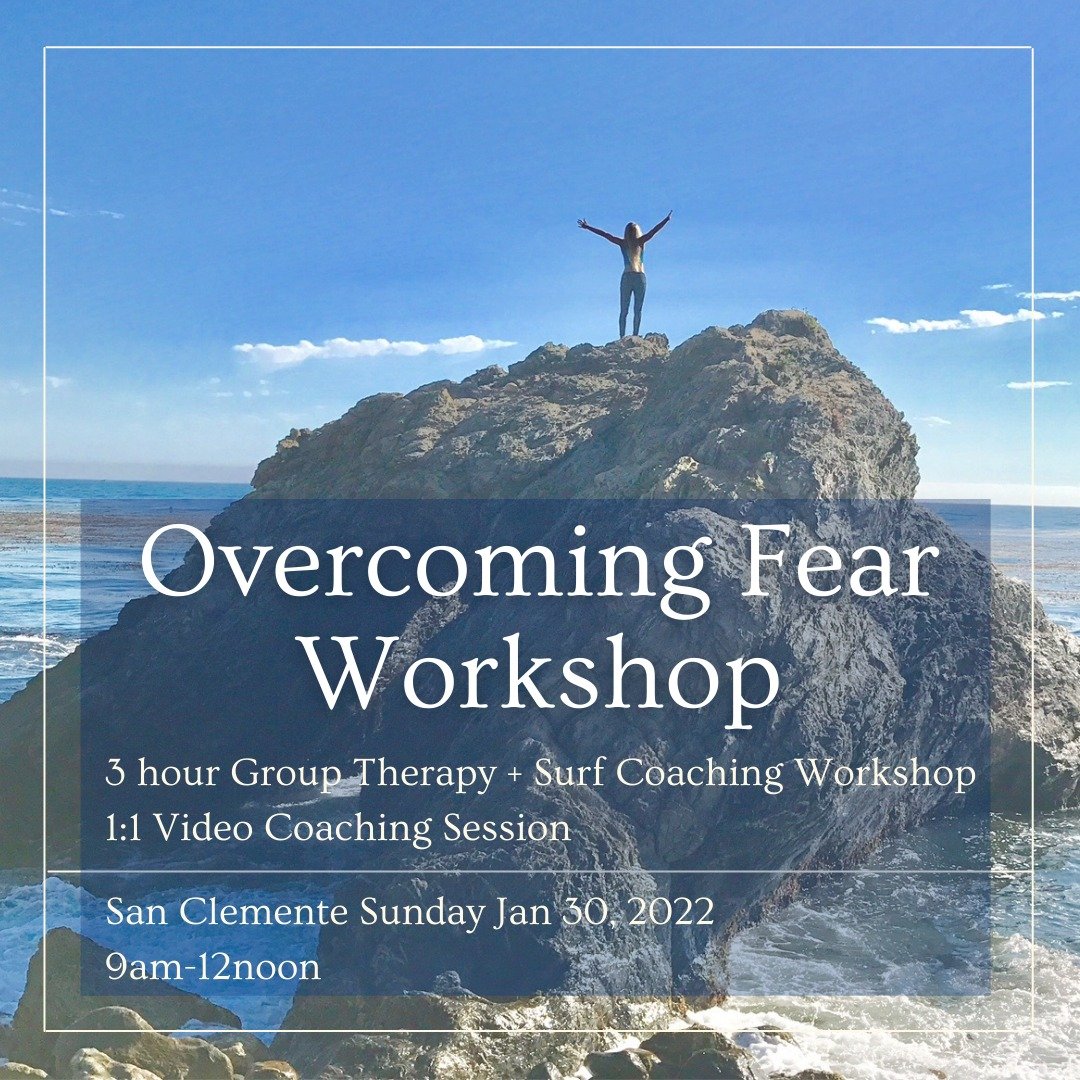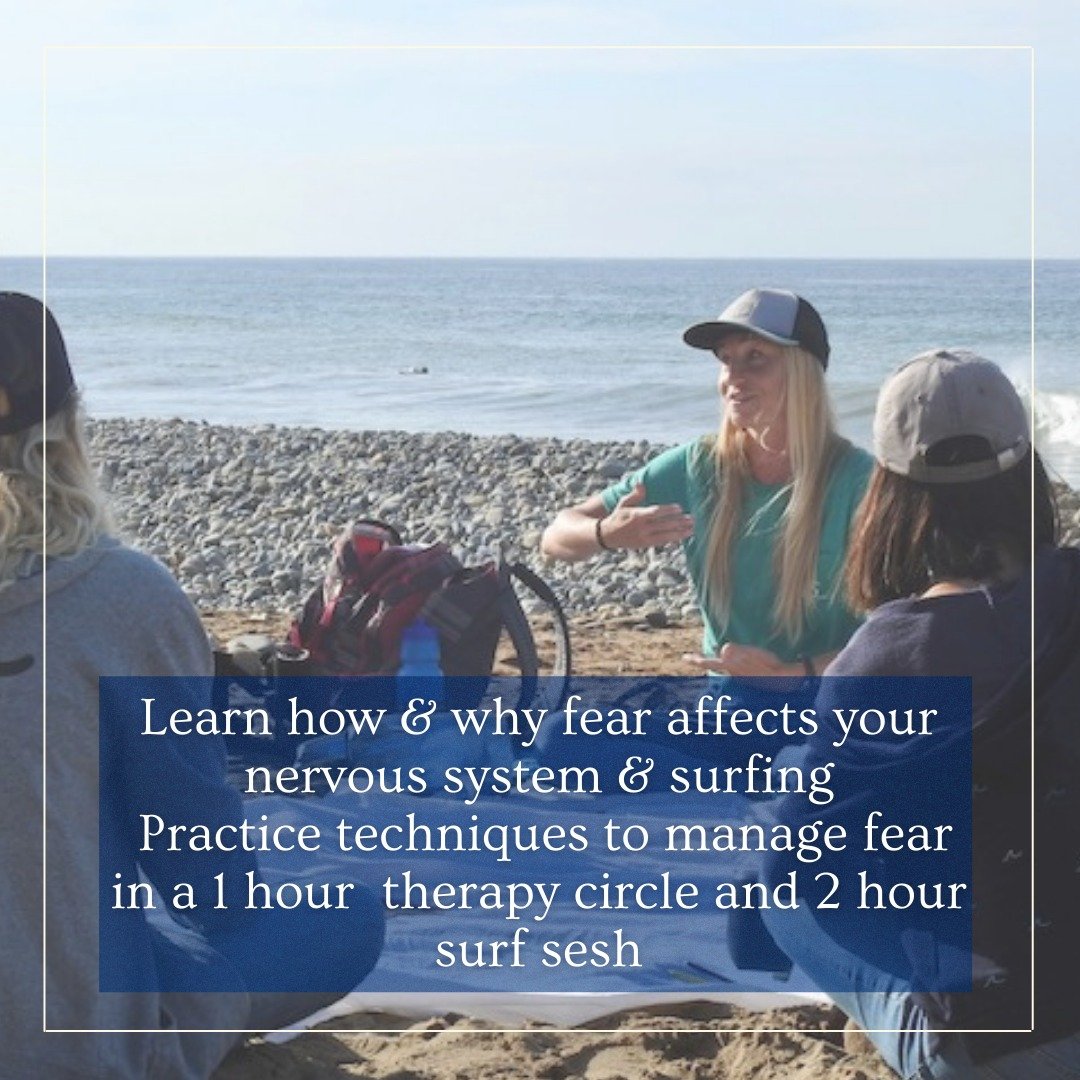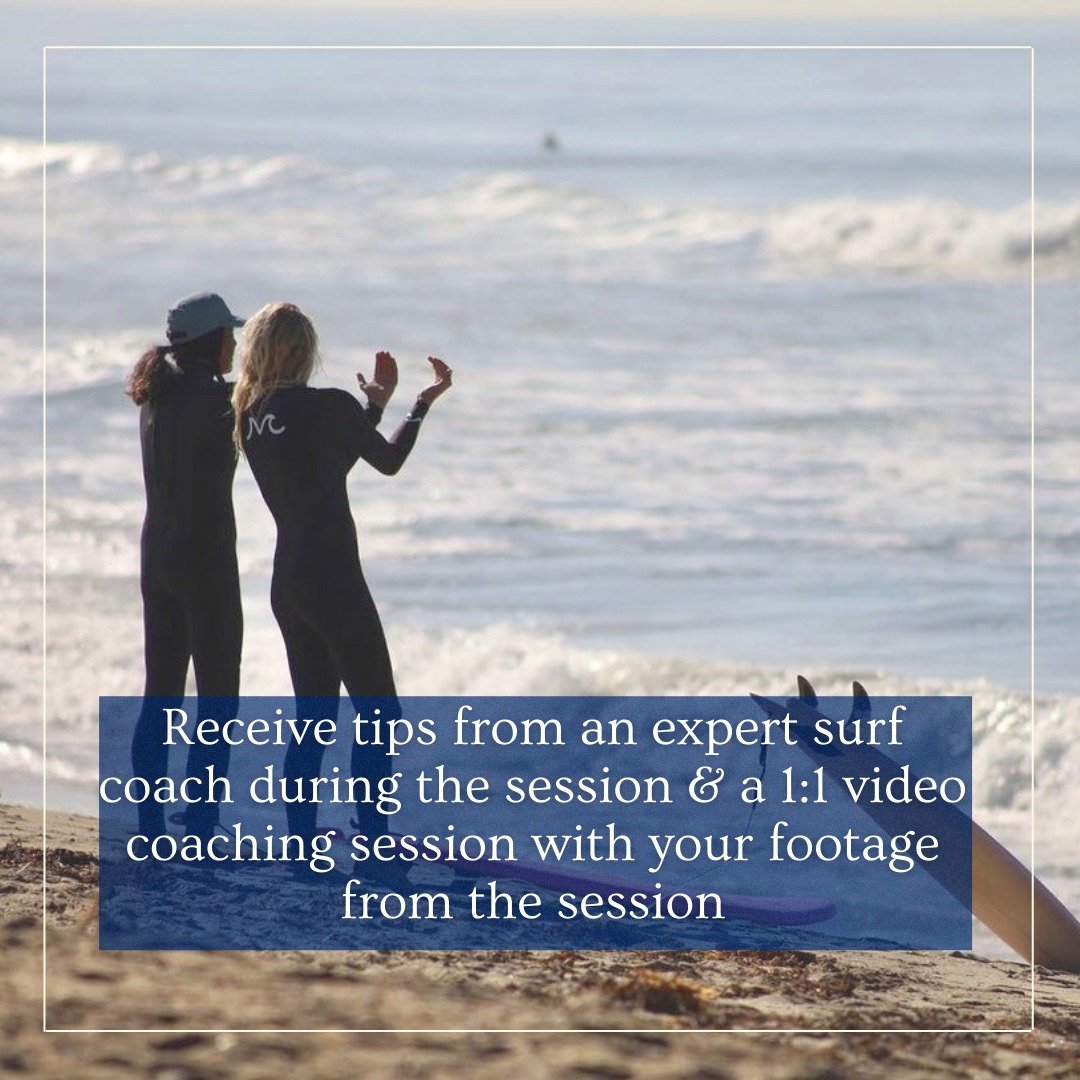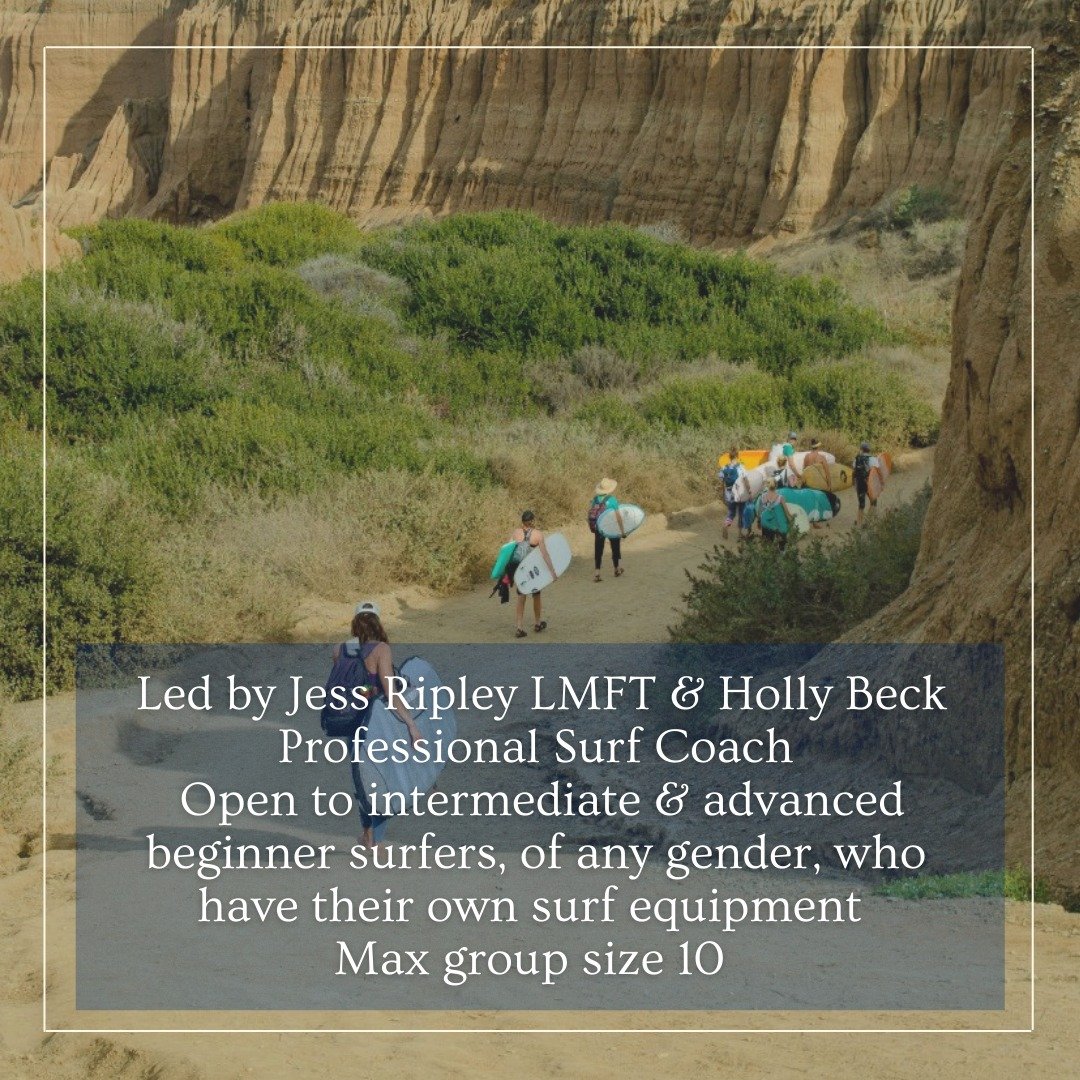Overcoming fear caused by a long-ago injury
Fears from injury can linger if not addressed. The coping mechanism often suggested by our society : to “just get over it and get back out there,” can work, in the sense that it might not stop you from continuing to surf. However, it doesn’t help process the trauma of the injury. Therefore, even 20 years later, one might still feel the effects.
Lately, i’ve received a few emails from potential clients who mention that they experience fear in the water that has lingered from a past injury. That situation seems to be really common and brought to mind the story of an Amiga that I met back in October in Morocco.
I was in Morocco on day 1 of a Surf With Amigas Holistic Surf Coaching retreat, just getting to know the guests and starting to form a mental image of each participant, her goals, and how I could be most helpful. One of the participants, we’ll call her “Sarah”. The vast majority of our guests use boards from our quiver to avoid having to travel with a board bag but Sarah had brought her own - a Takayama mid-length. I could tell by our chit-chat about the conditions even before we paddled out that she knew how to surf. She presented as strong and confident, walking down the hill to the waist-high peeling rights.
Long right point break in Morocco
In the water, she paddled assertively, positioning herself well, taking off with perfect timing, and maneuvering down the line. “She knows how to surf!” I thought, and then told her so as she paddled back out to me. “Ya, i’m fine when the waves are small and easy,” she replied.
A few days later, the swell was small enough that the point break was slow and boring. We made our way around to the more exposed beach break on the other side. The waves still weren’t what i’d call “big”, but they were closer to head high. The peaks popped up and broke more quickly. The wave was soft, breaking over sand, but there was a quickness to it, particularly in comparison to the slow easy point break waves we had been surfing. I noticed a different energy in Sarah. If she was closer to the peak, she’d pull back and not take off. If she was anything close to being a little late, she’d let the wave go. Having surfed with her for a few days, I believed she had the skill to take off late and deep and make it, but she was avoiding those situations.
Punchy beach break waves
In taking a moment to connect with her and ask about her experience, her story emerged. 20 years ago, she’d been in deep Baja CA, a week into what was meant to be a month-long+ trip. While trying to take off on a wave, she was a bit too late on a steep section. She tried, but didn’t make the drop. She became one with the lip, and in the process landed on her fin, which gouged deep into her thigh. It took a while to get the attention of the people she was with, to get to the relative safety of the beach, only to then endure a long bumpy drive to a very basic clinic and scary health care situation in a remote area. The injury ended her trip. Once back at home and eventually healed up, she flung herself back into the ocean. She didn’t want to let the injury stop her. She didn’t want to appear weak. She tried to forget about it and just keep surfing. That worked…. sort of.
As we drifted outside the surf zone, I quietly listened to her story. It all made sense to me. Her body had suffered a painful trauma. If the injury had happened in CA and she’d received help immediately, including good medical care, and the whole experience hadn’t ruined a long anticipated adventure, it may not have become as heavy of an emotional weight. In her case, the physical memory of painful injury combined with the fear and anxiety of the remoteness of the location and large serving of disappointment due to the altered trip, all combined to serve as a significant trauma. The coping mechanism often suggested by our society : to “just get over it and get back out there,” worked, in the sense that it didn’t stop her from continuing to surf. However, it also didn’t help her process the trauma. Therefore, even 20 years later, she still felt the effects.
My turn to get one!
Sarah initially told her story without much emotion. It was very matter of fact, as if telling a story that had happened to someone else. I listened, asked a few questions to be clear on the details, and then started by validating how scary that must have been at the time. I gave her space and encouragement to sit with the feelings of fear. When given an opportunity to connect to the feelings of the story, the tears started flowing. She apologized, but I encouraged her to let the feelings happen. It’s ok to not be ok right now.
After the moment passed, I explained that it’s totally normal and understandable that she feels fear when faced with a situation (a steep drop) that triggers her body to remember a time it was injured. By ignoring it or avoiding those situations, she isn’t allowing herself the chance to move past it. We talked about the importance of accepting the fear. Rather than trying to avoid the fear or feeling shame that it exists, the healing process begins with allowing oneself to feel it. Her body is trying to keep her safe. That’s a good thing. We took a minute to listen to that message, accept it, and actually thank it for its efforts, allowing whatever emotions arise to flow. I suggested to talk to that fearful part, telling it, “I’m sorry you were hurt so badly. That was a very scary time and your reaction was perfectly justified. Thank you for trying to keep me safe. I appreciate you.”
Once that fearful part has had its chance to fully express whatever needs to be expressed, and those feelings are accepted and appreciated, there’s space for the next step, which is to notice what has changed since then. Since that time, Sarah has been surfing for 20 years. She is a much better surfer than she was back then. She has the skills to make steep drops. If there’s any doubt about that, surf coaching and working on popup technique can help.
Then starting small. On a small wave that’s only a little bit scary, try to pop up late. Notice the feelings that come up. If there’s fear, thank it for what it’s trying to do (keep her safe), but assure that part that she is capable. Come up with a positive mantra that works not to argue with that voice, but to change the script. Little by little, work up to bigger waves and steeper drops, not ignoring fearful feelings, but embracing and accepting them. Celebrate successes, lean into falls, and smile at the simple pleasures and teachings of the ocean.
In preparing to post this story, I checked in with Sarah to see if she would be ok with me sharing and also to see if the she’d noticed any positive changes in the four months since our session. She said,
Yes it did help…. I repeat "all is well" to myself pretty much every time I turn for a wave now. It reminds me I'm ok, that I'm in control, and that it's supposed to be fun. I think I never gave myself permission to talk about my injury because it maybe seemed trivial and I had no one who would understand it in a more complex way. So yes, it definitely helped. And it's a process. And just the permission to address those things in my surfing that hold me back helped so much. I feel like every session since Morocco is accompanied by a memory or conversation from the retreat that empowers me. I'm really glad I went and I look forward to going on another next year. It was an incredible experience and I really appreciate you listening and noticing and being there.
Drop In Sessions : Podcast Featuring SWA Founder Holly Beck
Podcast episode featuring Holly Beck
“the way we show up in the water is a metaphor for how we show up in life” - Holly Beck
Episode 8 of The Drop in Sessions @mermaidgin has landed + features one of the most loved and influential women in both pro and grassroots surfing, @__hollybeck ✌️
Holly’s career has been multifaceted, successfully impacting women’s surfing for the better at a true grassroots level. As a powerful athlete competing for over a decade, Holly became a global name, gracing campaigns, covers, and tv shows as a successful model. However, you’d be a fool for assuming Holly fits the stereotypical blond surfer chick boilerplate.
Holly recounts the typical experience for female pros at the time, having to “fit into this marketable mold, kiss up to the male owners of different companies and really wear a mask and do a dance”.
After moving to Nicaragua and establishing the globally adored @SurfWithAmigas retreats, Holly’s work continues to incorporate her studies in surf therapy and a Master’s degree in counseling into surf coaching.
Have you ever wondered why exactly you didn’t go for that set wave? Why you were scared of it and what drove that fear?
After a tumultuous period separating from her ex-husband and losing both her sister and her brother in law to an accidental drug overdose, Holly was inspired to start her Masters course. This was partly for “self-healing, being more empathetic, and to hold space better for the people that mattered”. Holly’s learnings from both general therapy and surf therapy have allowed her to tie these aspects into her surf coaching. This has seen her explore a way to teach people to have a more intentional surf practice.
This truly insightful episode charts Holly’s journey of self-discovery and acceptance, of setting herself apart and being proud of the differences that make her unique….dive in!
Do you need to end your session on a good wave?
There’s a belief among surfers that it’s shameful to paddle in, but is that true? Is it healthy? What’s wrong with paddling in?
I used to need to get a good wave in. Not a great wave, because then I’d have to go get another. Not a bad wave, because I just couldn’t go in on a bad one. I definitely couldn't go in if I fell on the last turn. I needed to get a good enough (but not too good) wave, and ride it all the way in, AND complete the ending turn or else try again.
That was fine when I was a pro surfer. But even years later, the idea of paddling in to the beach felt like failure. Why?
I know I’m not the only one. Somehow as surfers, we tend to forget all the other good rides in a session or even just the simple joy of being in the ocean that we experienced upon paddling out, and let that last ride dictate the quality of the surf session and for some people, the way we feel about ourselves. That feeling lingers for the rest of the day, or until that next wave.
Someone asked me the other day if my experience with holistic surf coaching had changed my own relationship with surfing. Yes, it has.
A moment of meditation during a Holistic Surf Coaching Retreat
My relationship with surfing (and with myself) has gotten healthier. I’ve gotten a lot better at separating my performance in the water from my feelings of self worth. When I need to go in, or just realize I’m not having fun anymore, I’ll try to ride one in, but if that wave doesn’t come, I will paddle in.
To all those who might say “I can’t paddle in!” I ask you, “why not?”
Discuss with a friend and let me know what you decide…
Holistic Surf Coaching in San Diego May ‘22
Holistic Surf Coaching sessions in May with Holly Beck and Groundswell Community Project. Join us for small group sessions to improve your surfing practice in and out of the water.
Join me Fridays (one or all) in May in San Diego for small group Holistic Surf Coaching sessions.
I’ve partnered with Groundswell Community Project for another round of Holistic Surf Coaching sessions. We’ll meet on Fridays from 9-1130am in a small group (max 6 participants with 2-3 facilitators). The sessions will include some time on the beach exploring mindfulness, coping mechanisms for fear, anxiety, frustration, focusing on positive self-talk, building community, finding confidence in the lineup, and also going over some practical surfing tips. We’ll then paddle out for a filmed surf coaching session.
Also included is a virtual 1:1 session with me to go over the footage that was captured and also dive deeper into your specific situation. Whether the focus is something going on in your personal life on land, or things you experience while surfing, we can chat more about whatever comes up as well as work on ways to improve your surfing.
All ability levels are welcome, although we prefer you have some prior surfing experience and your own wetsuit and surfboard.
Join us for one in-person session and one virtual session for $250.
Sign up for all 4 sessions and 4 virtual sessions for $850!
Dates and locations:
May 6 - Tourmaline
May 13 - Beacons
May 20 - Tourmaline
May 27 - Beacons
Email Holly at holly@surfwithamigas.com for more info or how to sign up!
Video from past session:
Overcoming Fear Workshops Explained
Holly Beck and Jess Ripley at the Overcoming Fear workshop
Jess Ripley of Sea Love Healing and I have been hosting some overcoming fear workshops lately. We'll talk about what fear is, how it shows up in your body, take a moment to share what makes you feel fear in the ocean, teach some emotional regulation and coping skills, then dive into the practical aspects of surf skills that can help you feel more confident. More info here!
Listen to Holly on kookcast
Holly Beck talks Surf Therapy and her interesting life story on Kookcast podcast with Coach Chris from The Surf Continuum
I got a chance to sit down with Coach Chris from The Surf Continuum to have a nice chat about my path in surfing from a grom being told I was doing something wrong, to my first garage-sale-scored surfboard, to becoming president of the women’s surfing union fighting for equal rights in pro surfing, to moving to Nicaragua, to starting SWA, to moving to CA and my current thoughts on surf therapy and what’s next. If you want to hear my thoughts on those subjects and more, check it out!
Also, the Kookcast podcast is funny, smart, and worth a listen so make sure to like or subscribe or whatever podcast listeners like you do in order to keep listening!
Enjoy!
In The Press: The inertia
The Inertia wrote an article about my path from pro surfer to surf therapist.
I was honored to be featured in an article by Alexander Haro for The Inertia.
Holly Beck has lived an interesting life. It hasn’t been a nine-to-five existence. She hasn’t toiled away at a desk under the bright, flickering glare of fluorescent tube lights. Instead, from an early age, she pointed herself in the direction of things she loved and created a career that revolved around them.
Taking a walk with my beautiful Rusty Surfboards longboard in Nicaragua
The article tells the story of my background, starting Surf With Amigas, and what has led to my current path.
Surf With Amigas was a relatively novel concept at the time. There were other surf camps in the area, but Beck’s was built differently from the foundation up. While other retreats were either solely focused on learning to surf or giving a surf-centric luxury getaway, Surf With Amigas was more about adventure.
“I really like having adventures,” she said. “I was like, ‘okay, the accommodations are going to be a little bit more rustic, but we’re going to get the most badass female surf instructors that are going to be your friends and role models, I’m going to pay them really well — most of the other surf camps were just doing work trades at the time — I’m going to pay them well so they stick around. It was more of an empowerment-surf-adventure type thing. Instead of just a luxury thing with facials in a nice villa, we wanted to get down and dirty and gallop down the beach on horseback. We’re going to slide down volcanoes and put you beyond your comfort zone in big waves. We’re going to film everything and give you all the techniques to be the best you can be. I feel like we were the first to use that formula.”
Overcoming Fear Workshop Feb 13, 2022 San Clemente, CA
Overcoming fear workshop in San Clemente, CA with Holly Beck and Jess Ripley.
Fear is one of the most common barriers in surfing. While fear can be a healthy reaction to a dangerous situation, often times our nervous system is working over-time to try to keep us safe in a situation that we are actually fully equipped to handle. In this state of over-activity, we tend to freeze up or run away, and have a hard time going after those surf goals, whether they be to get tubed, ride a bigger wave, or just get out there at all when it’s over 2-3’.
Holly and Jess getting excited to paddle out!
Jess Ripley and I have come up with a workshop to help you understand what’s going on in your body when you experience fear and some tools to help you overcome it. Join us Feb 13th at Trails in San Clemente for an in-person 3-hour workshop. We’ll spend an hour on the beach in a small group setting and then have a 2-hour surf session. The session will be filmed and we’ll schedule a 1:1 zoom call where i’ll meet with you to go over your personal experience, your surf footage, and anything else you might want to discuss (surfboards, goals, etc.).
Details
When : Feb 13th, 2022 from 9am-12pm (meet at top of trail at 830am)
Investment : $250 for 4 hours of instruction (1 on land, 2 in the water, 1 on zoom, plus getting to keep your surf footage)
Who is welcome : Anyone with some prior surfing experience and their own equipment. You don’t have to be an amazing surfer but ideally you have already mastered standing in the whitewash and are capable of paddling yourself out into the lineup. All gender identifications are welcome. Max group size - 6.
Holly Explains Surf Therapy
Holly Beck explains Surf Therapy
Surf Therapy is a relatively new therapeutic modality that is gaining research evidence to support the efficacy. You’ll be forgiven if you’ve never heard of it or are wondering how it works. Here’s a little video of me explaining my perspectives on Surf Therapy.
From Pro Surfer to Surf Therapy Intern
From pro surfer, to surf retreat owner, to surf therapy, here’s the story of Holly’s journey.
I grew up as the oldest of five sisters in a coastal upper middle class neighborhood of Los Angeles, California. Despite a lot of privilege, my childhood and adolescence weren’t easy. Once I found the ocean though, I had a place I could go to feel at home. Regardless of what was going on for me at home, I noticed that I always felt better after playing in the ocean. The only issue was that in the mid 90s as I was learning to surf, surf culture wasn’t always a welcoming place for young girls. My mom had warned me that “surfing is for boys, you shouldn’t be out there competing with them.”
By age 15, I had overcome the initial barriers, bought myself a surfboard and wetsuit, started competing, and a few years later achieved my dream of becoming a professional surfer. For almost ten years I traveled the world with my surfboard, competing, modeling, and eventually producing my own content in a time before social media made that a common thing to do. Throughout my journey though, I always had the underlying feelings of not fitting in, of having to change or at least hide who I was in order to be accepted. As I got closer to 30, I got tired of playing that game. The constant travel started to wear on me. I longed for the stability of a consistent relationship, time to nurture a garden, the companion of a dog.
In 2010 I dropped out of the scene and ran off to Central America. It was there, on a remote beach in Nicaragua with a smoking volcano in the distance and hollow beach break waves pounding me into the sand on the daily, that I could be whoever I wanted to be. Barefoot always, running down the beach before sunrise with my surfboard and a pack of dogs at my heels, I lived in a tiny house without power or running water and was the happiest i’d ever been.
I’d earned an MBA while on tour and used those skills to found a women’s surf and yoga retreat business focused on giving women the knowledge, support, and community that I had been lacking when I was trying to learn to surf. It was also a way to import rad female surfing friends to continue having adventures and sustain myself in my dream of living in Nicaragua.
Another ten years passed and with two kids entering school, plus a variety of other reasons, I decided to give in to what seemed like a pull back to California. I’m still running Surf With Amigas from afar and will pop down for retreats a few times a year. I love learning and challenging myself with new projects.
As a master’s of counseling student i’ve learned so much about myself and the people around me. I’ve learned a new dimension of surf coaching that goes beyond just body positioning and wave knowledge. It’s been really exciting to make deeper connections between the experiences we’ve had earlier in life and note how those impact our way of interacting with the world and the people in it, and then notice how all that plays out in our surfing practice. From there, learning tools to approach the ocean from a healthy mindful place those tools can also be applied to other parts of life. That’s the foundation of holistic surf coaching.
